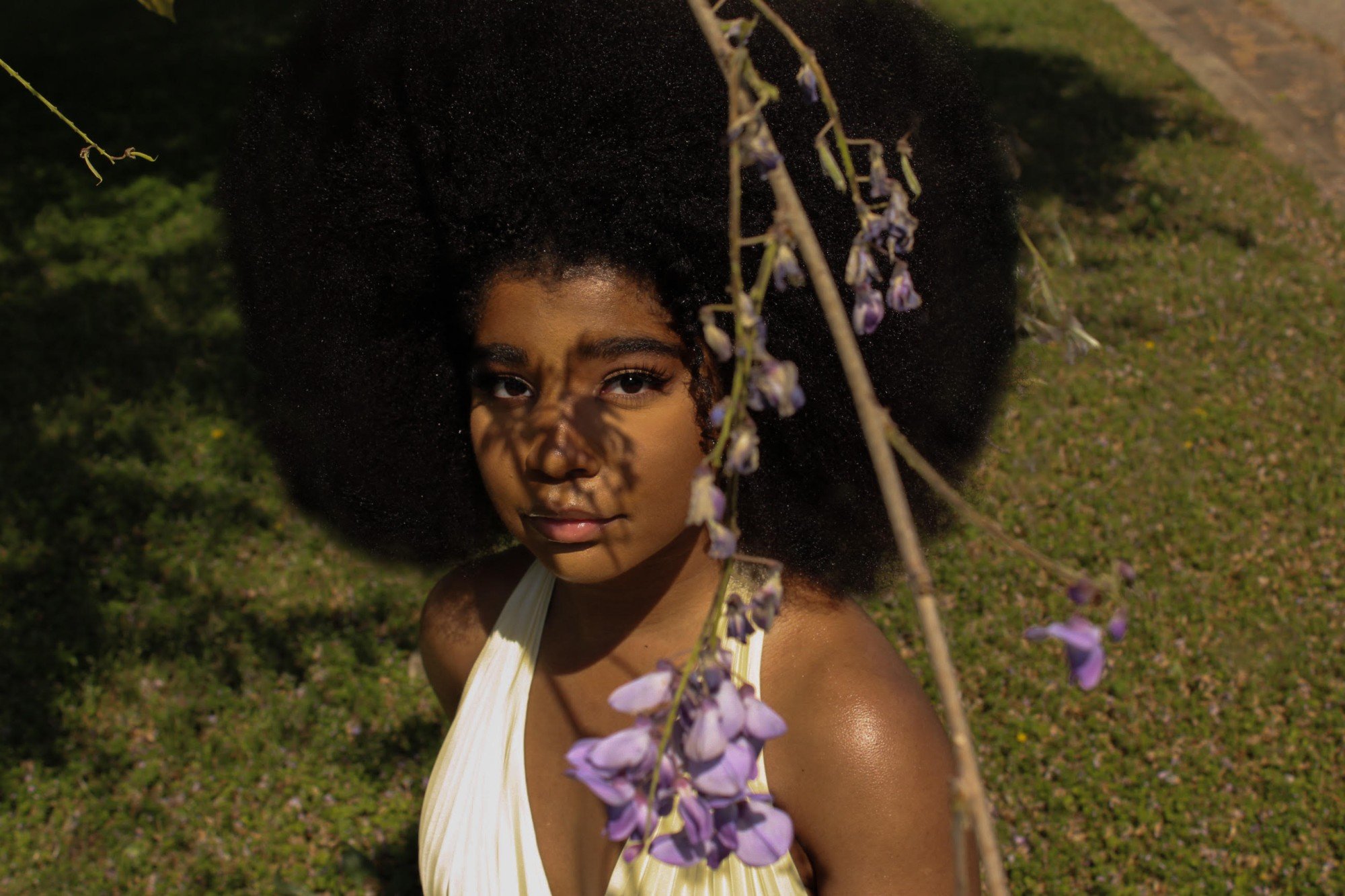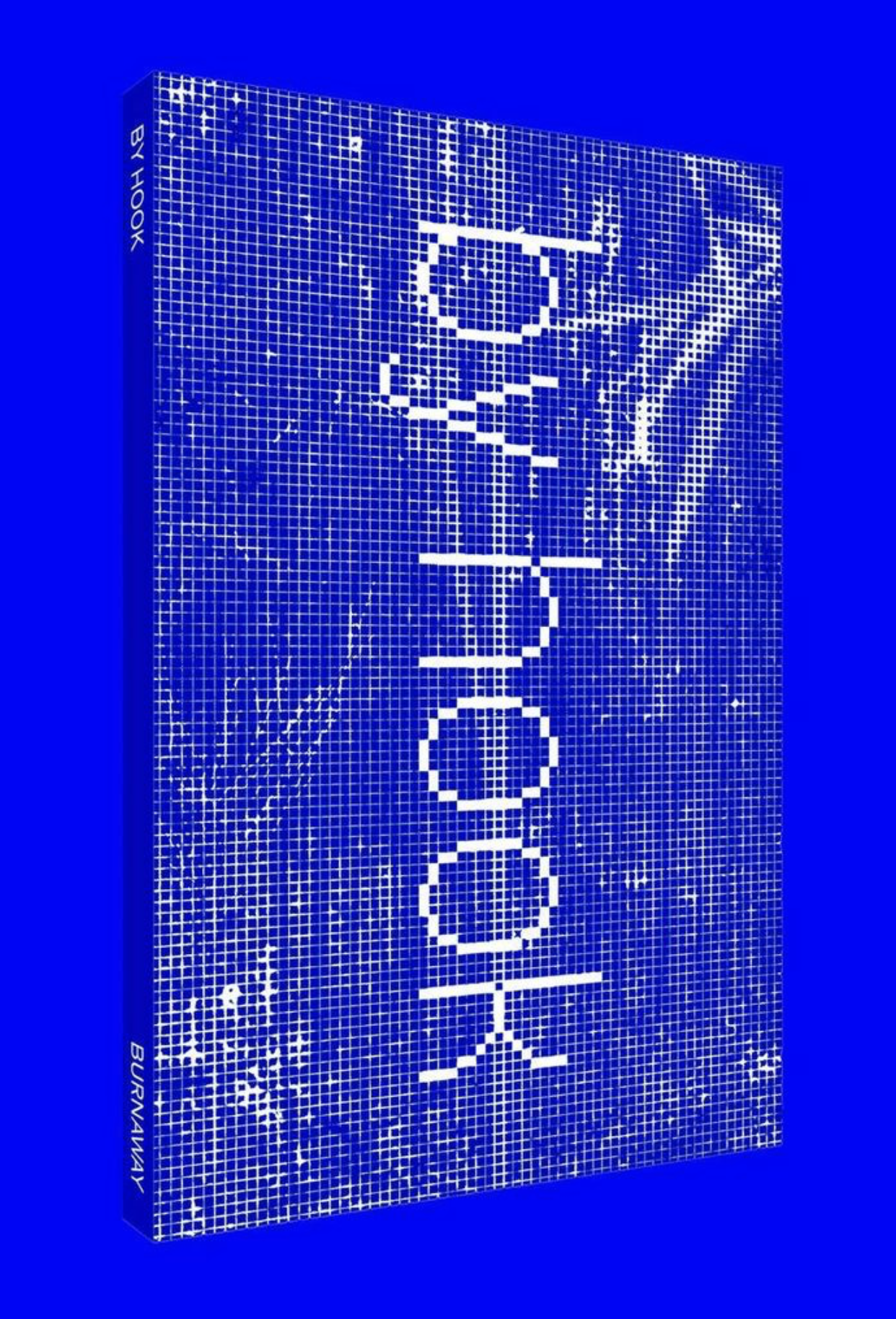Interview: Bryn Evans
In mid-December I talked with poet, curator, and critic Bryn Evans (she/her) over Zoom. Bryn is from Decatur, GA, and is currently a PhD student in Art History at Stanford University. She was formerly assistant editor for Burnaway, a contemporary Southern arts magazine based in Atlanta. Bryn is also my dear friend, and in this conversation we spoke about memory, faith influencing creative practice, Black womanhood, online curation, and what would happen if we plant one of her poems into the ground.
This interview has been lightly edited for clarity and ease of reading.
⚘⚘⚘
Amir McClam: Can you paint a picture for me of Baby Bryn? What kinds of things were you interested in as a child?
Bryn Evans: Oh, I love this question.
I'm looking at a photo of myself when I was about 1-year-old right now. And Baby Bryn was just joy. I enjoyed dressing up. All of my different outfits—a lot of them being hand-me-downs from my older sister— had their own kind of personalities. Whether it was some overalls or some patent leather shoes for church, I just remember really enjoying the ritual of getting ready.
I was very observant as a child. I really enjoyed looking. That's something that still remains true today, observation and witnessing, and learning through witnessing. I was pretty quiet as a child, which is to say. [Laughs] And I think at times, you know, my parents and my relatives and my teachers were a bit concerned because I was so quiet, but I think I was just like a sponge. I was a sponge just absorbing everything around me. So yeah, I would say joyful observance. I enjoy the soft things of life, I always have. And play— I really enjoyed play.
AM: Nice. How would you say that Baby Bryn shows up in your life and in your work now?
BE: Hmm. I think in a lot of different ways. On the one hand, Baby Bryn and still current Bryn, I'm always aware of the rules that come with the different scripts that society gives us. Whether that be, what am I expected to do as a writer or a critic? What am I expected to do as a person, as a woman?
And I think there's always been a sort of resistance against those scripts. So one of the ways that Baby Bryn shows up is through that resistance, in finding different, often quiet, ways to resist. She's also really creative and that's one of the ways in which I find resistance: through creativity: really leaning into the fact that I can do something unexpected.
Something that rang true for me as a child and that I am still reckoning with is the idea that being different made me special. [Because of this,] there was always an effort to be innovative and be extraordinary and feeling— feeling disappointed when I felt that that was not true for me in that instance. One of the ways that I try to comfort the younger versions of myself is with the reminder that through observation, I can still lean into that student-of-the-world mentality and go against this fear that I have to be doing something in order to be worthy or valuable.
AM: Yeah. Thank you for sharing that. What you said about this inclination to be different or extraordinary was really fascinating, and also like, very Aquarius of you too. [Laughs]
BE: [Laughs] Yeah. I think there was always this pull to fit in and be like, cool and popular, and all of the little glimmers of girlhood that come with growing up, at least in my experience. But there was also always an underlying self-recognition that as much as I'm striving for this thing, I know that it isn’t for me.
AM: Mm-hmm.
BE: That's a tension that's always existed. I'm finally just trying to lean into me— not a trope, not an era, not a character, just me, as I exist. Really just embracing that rather than trying to quiet it.
AM: Right. Yeah. That's beautiful.
BE: Thank you.
AM: Okay. In addition to being a beautifully talented writer and poet, you're also a very intentional curator of exhibitions and public programs, especially of work by Black women and gender variant folks. You recently worked as an assistant editor for Burnaway, an arts magazine based out of Atlanta, and also were a curatorial fellow for The Poetry Project in New York City. I'm curious to know what guides your curation, and what brought you to that mode of holding space?
BE: I think Black women have always moved me, and that is what really guides my curation. Whether it be the words, or the memories, or the artwork, that is always where my work stems from. I can't think of a single project that hasn’t found its conception in a Black woman. It's always been a dream and a mission of mine to really acknowledge those who have done the work and who are doing the work.
AM: Mm-hmm.
BE: Which is also to affirm me as someone who does this work as a Black woman. It just feels what's most close to home. Especially when I'm leaning into a program or a curatorial project, ultimately what I'm really thinking about is the takeaway for the audience. And I want it to be something that's really genuine, and feels really rooted in the self.
One might say, “oh, who is your audience then?” And one, that audience is Baby Bryn. What does it mean for her to witness this sort of work, when she was told that it didn't exist or that it wasn't possible? And it's also for others who can connect to that personal desire to witness something that others tell you does not exist.
And the second part of your question was what led me to curation in that space. I didn't really know what curatorial work was until I got to college and my first African American Studies lecture was taught by an independent curator, Kalia Brooks Nelson. She formulated our syllabus around different exhibitions taking place in New York City. That being not only my first intentional time and experience in a gallery, but also my first time intentionally engaging Black studies in an educational environment, was so impactful for me. I recognized curatorial work as something that was meant to communicate something. And so I think of curatorial work as a mode of communication.
AM: That's amazing. When you say that your goal is to have this space of genuineness, especially for the participants, I feel like you always succeed at that. Whenever I go to one of your events that's online, I've always just felt so moved. I can definitely feel how much intention that you pour into that space.
BE: I really appreciate that. You're pointing out something that I haven't really recognized in myself, which is that the majority of my curatorial work has taken place digitally and online.
I really came into the work during [the start of] the pandemic, and I think digitally it proposes challenges and also provides benefits. Because, you know, digital worlds do offer a sort of intimacy that sometimes can be difficult to access in the physical world. But additionally, there's sort of this mediation going on through the screen, and so it's always been a question of how can I connect my world to someone who's in a different world that is also my own? Someone is letting me in their space and that is sacred. Whereas in a traditional museum or gallery setting, you're telling someone to come into a space that they might not feel is their own. Curating projects that take place online is a unique opportunity to really bridge worlds.
AM: Hmm. Yeah. If you could curate an event or gallery with any five artists across space and time, who would they be?
BE: Wow. Across space and time. A big question.
Okay. Augusta Savage is the first artist that comes to mind. Her work, “Lift Every Voice And Sing,” also known as "The Harp" was created for the 1939 New York World’s Fair. It was a beautiful sculpture that took its name from the Black national anthem, "Lift Every Voice and Sing".
Because Savage didn’t receive enough financial support to cast the work in bronze, it was destroyed shortly after the fair. I wish that she had been granted the funding to preserve that work when she was living.
Julie Dash, whose film works are just phenomenal, and that's also making me think of Ja'Tovia Gary, another visual artist and filmmaker from Dallas.
I'd probably wanna do work with a collective or group, maybe a choir. If not a choir— I'm thinking about the ephemera of church that is also just so near and dear to me— whether that be tambourines or church fans. And that's making me think of Lava Thomas and her work, “Looking Back and Seeing Now.” I did an interview with Lava and Dr. Bridget Cooks when her work was at the Spelman Museum of Art, and she has this beautiful floating installation of tambourines and the cymbals become these really gorgeous mirrors.
AM: That sounds stunning.
BE: And then I need one more artist. I’d love to collaborate with Akea Brionne, who is another visual artist that I've interviewed in the past. She was included in this year’s Forbes' 30 Under 30 in the Art & Culture category.
This is a question that I'm gonna continue to ask myself. Especially the bridging of time and space, I think it's a really cool idea to think about the artists who are no longer earthside that I would enjoy working with. Thank you for that question.
AM: Yeah. Thank you for that response. It was interesting that you mentioned wanting to work with a choir, inviting that churchy energy into this space. My next question actually is about that. From my friendship with you, I know that faith is a really big part of your life, and I've also noticed a lot of themes of spirituality in your writing itself; a lot of your work actually feels sacred. In your poem, "Untitled (Grace)", that's on The Poetry Project, you write, "grace wrings water from my roots." What's the role of religion, divinity, and faith in your poetry?
BE: I am a church girl, through and through. So it's always felt very unnatural to divorce that part of myself from my poetry, because poetry for me is about getting to the heart of something. And at the heart of me is truly this faith, that is also my mother's and my grandmothers’ and great-grandmothers’ and my great-great-grandmothers’, and their kin.
So I would say that faith is what makes the work possible. In that line, I'm talking about washing my hair. [Giggles] As I'm listening to some gospel music on wash day, that's what I’m alluding to. But also it is this flushing of memory that comes, what Toni Morrison calls "a flooding." I think grace is like that. In the same way that she says, “all water has perfect memory and is forever trying to get back to where it was.” Grace is a gift that reminds us of who we are, which is so necessary when doing this work, remembering who you are.
AM: Absolutely, so beautiful. Thank you for sharing.
BE: Thank you, for sharing.
AM: You use spacing in very interesting and experimental ways in your poetry. I read in another interview that you did with The Columbia Review, that you understand spacing and punctuation as a way to “assist the reader in breathing.” This got me thinking about the potential for poetry as a form of embodied instruction. I'd love to hear from you, how else can poetry instruct or assist us in embodiment?
BE: Yeah, it's an interesting thing that happens when you are reading someone else's words, because in a way you are being asked to step out of your body, and inhabit the world of someone else and how they experience it: what they notice, what their senses are telling them. That requires a certain trust and vulnerability to be able to enter and inhabit a mind that is not your own. Lately, I have been engaging journal prompts [where] a consistent theme has been recognizing [that] something I notice in someone else may also exist within myself.
In a way, poetry allows its readers, and in turn its writers, to notice something in the world around them, through the experience of the writer, that already exists within themselves. Whether that be a hidden desire or a shadow or anything of that nature. It requires you to go deep in that way.
AM: Interesting. My last question: there are a lot of images of gardening and plants that I noticed in your poetry. In “Emerge as it must.” [after Danielle Deadwyler] you write, “ you’da thought i was God runnin/ nekkid ‘round my garden, growin things.” Can you talk about this act of growing and sprouting from the soil? If we put one of your poems in the ground and watered it with sun, what would sprout out of it?
BE: Such a gorgeous question. Okay. Ooh.
I think the planting is really that deepness that I'm talking about. Landscapes and geographies are something that are also so true to me, and it goes back to what I was saying earlier about being observant. The act of planting is like a promise in a way. This expectation that comes with choosing to bury something that holds potential and believing that, with the right conditions, something will come out of it. Ultimately, that is a really fitting image for what I think the act of sharing poetry does.
AM: Mm-hmm.
BE: You're taking this seed of what you hope has potential and offering it to someone else who, with those right conditions, with that willingness to really listen and empathize, will allow it to grow and bear fruit.
AM: [Brushing away tears] I'm gonna cry. [Laughs]
BE: [Laughs] If I had another calling, I would probably be a botanist or something related to plants. It's something that is really true for me and my family. Planting and this idea of growing and sprouting something is really the way that my father shows up in my writing, because that’s how he’s always supported our family— through taking different landscape jobs, and helping out our neighbors by mowing lawns and doing really gorgeous work.
It's something that brings him great joy and peace, and dirt just feels good, you know? [Laughs]
AM: Mm-Hmm.
BE: It makes me also think of “Coal” [by Audre Lorde], which is one of the first poems that really had me think, this is me as words. She says, “I/ Is the total black, being spoken/ From the earth's inside.” Now I'm thinking about Angela Davis saying, "radical simply means grasping things by the root." All of these different thinkers, whether it be my dad or Audre Lorde or Angela Davis, or you in the way that you read my writing, there's something about planting and soil that allows us to come back to ourselves. It's a form of meditation. Which is also so important given, me being from the South, that's something that my ancestors did. Recognizing the lineage of sharecropping and chattel slavery that exists in my own bloodline—for me to encounter soil on my own free will, on my own volition, is something that I believe is very holy.
AM: Mm-hmm.
BE: What would sprout out of one of my poems if I were to plant it? I just want it to smell good. I really want it to smell good, whatever it might be; and for it to linger. Something that is so central to my practice as a human being is stopping to smell the roses.. It's a ritual of mine that reminds me that I am a person on this earth. Also to get a little churchy with it, one of my favorite Bible verses growing up was Matthew 6:28. It goes something like, consider the lilies, how they toil not, neither do they faint, but even God cares about them. It's this reminder that flowers grow and they don't worry, they don't work. They just exist, and they're still cared for and considered as valuable and enough.
And I consider myself that way, and try to think of how I can just exist and be at peace.
AM: Stunning. Beautiful. [ Tears up again, giggles]
BE: [Laughs] You cry, and I'm like… [Beams] Oh, thank you. Yeah. Thank you so much.
AM: That's all of my questions. Thank you for sharing so deeply and thoughtfully. It's been very beautiful to hear.
BE: I just am so grateful that you have read my work. And again, I think the art of poetry and the sharing of it is so important. Because speaking with you has reminded me of who I am, and I'm so grateful to be witnessed. Thank you.
AM: Yeah, absolutely.


